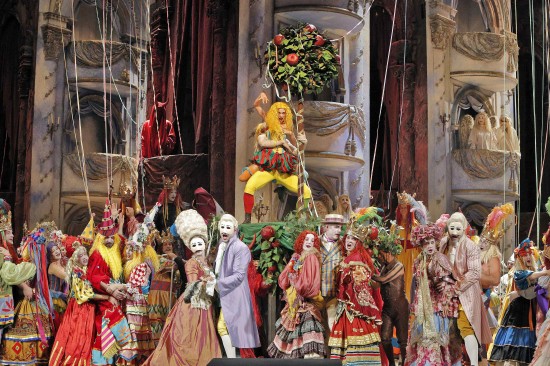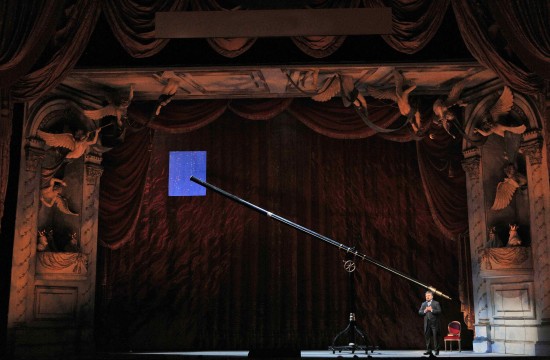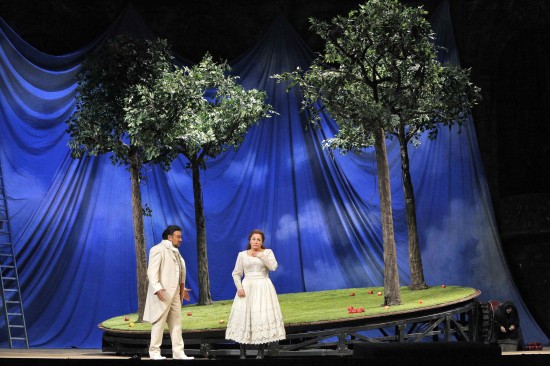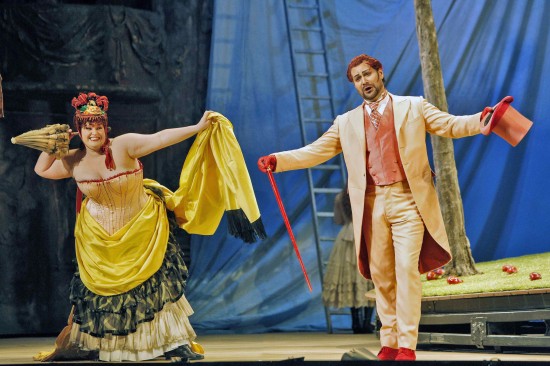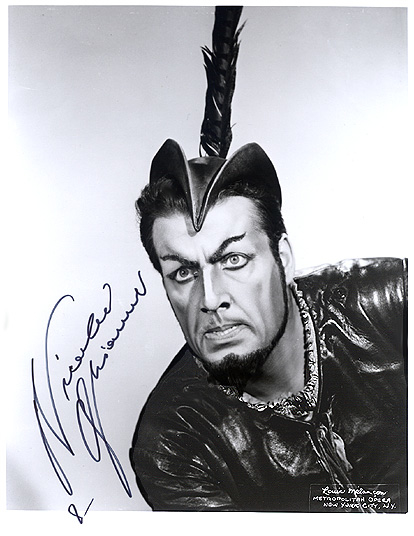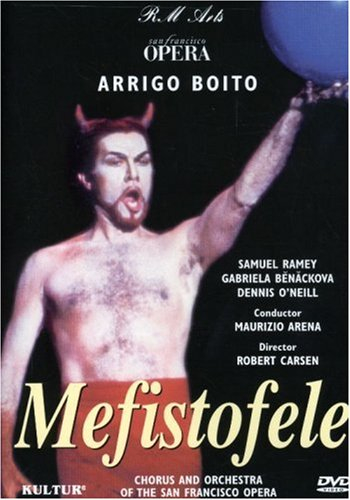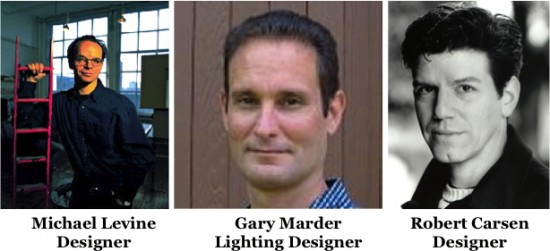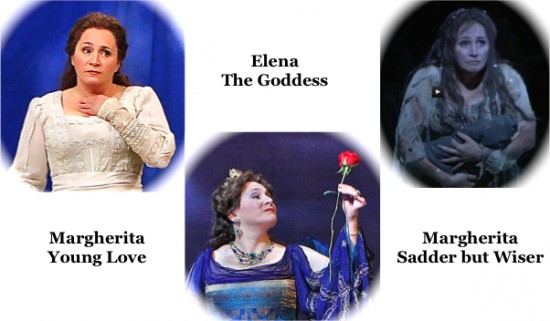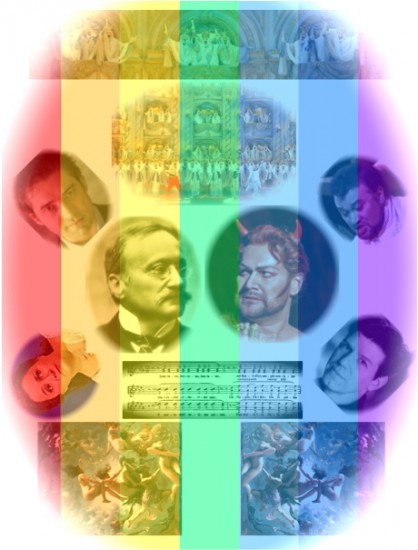I walk into the War Memorial Opera House, I show my ticket, the usher hands me a program, I glance at the cover, and WOW!
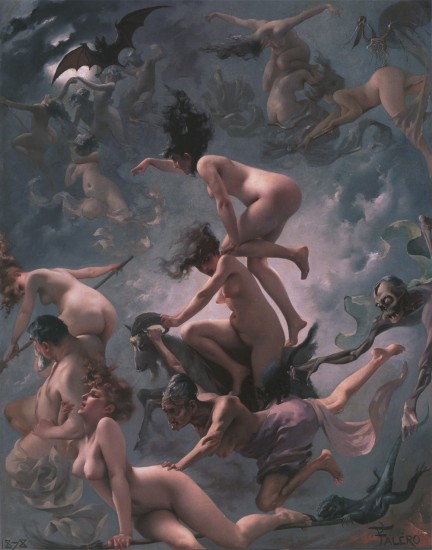
Program Cover: Witches going to their Sabbath by Luis Ricardo Falero (1851-1896); photo courtesy Wikimedia
Some four hours later I am on my feet in vigorous applause. San Francisco Opera’s production of Boito’s magnificent opera has fully lived up to the implicit promise of that cover. Need I say more? No, but of course I will anyhow.
You didn’t have to wait long to know that the evening was going to be a special one, musically. The opening chord from the 65-piece orchestra in the pit blasted your ears with a complex chord, only slightly dissonant. I don’t know how the strings and winds held it strong and true for as long as they did. After an instant’s pause, we heard the nine piece brass band playing from the Grand Tier lobby reply with a short muted melody. It was as if that epic chord had been echoed back from mountains at different distances, and each mountain had selected different notes to echo.
Almost immediately the overture merged seamlessly into the Prologue, the curtain rose, and we heard the 90-voiced choir of angels join in. However, at first we saw only a scrim filled with a blue sky and slowly moving puffy white clouds – clearly a symbolic representation of Heaven. Gradually the proscenium of an old-style European opera house becomes visible through the scrim, along with the mass of angels on the floor of the stage, but the upper part remains sky. The sky begins to darken and stars pop out in little clusters of three. The scrim becomes more transparent and the “stars” turn out to be bracket lights on the back wall of the opera house. Finally the scrim is raised and we see the three tiers of boxes along the back wall, each box with a trio of angels. While this is going on visually, the choir and orchestras continue their celestial music in praise of God.
Next, the top rungs of a ladder appear bathed in an eerie red light, apparently coming up from Hell (i. e., the orchestra pit). Mefistofele (Ildar Abdrazakov) mounts them, magnificently clad in a full-length red robe, which he soon removes to reveal his hairy chest, partially covered by a red jacket with tails down to floor in obvious symbolism. He joins his impressive bass voice in counterpoint to the angels, mocking their praise of God. As the Prologue reaches its dramatic climax he makes a bet with God that he can capture the soul of Faust.
Although Gonoud’s Faust and Boito’s Mefistofele are both based on Goethe’s epic poem Faust, they are two very different operas, both in form and in content. Gonoud’s opera is a classic tragedy told in the usual narrative style; it is based entirely on Part I of the poem and ends with the death of Marguerite. Boito, on the other hand, tells the story of both parts, and uses a more episodic approach with one or two loosely connected episodes in each of the 4 acts plus Prologue and Epilogue.
After the Prologue, the next Episode is a lively Festival on Easter Sunday with a wild mixture of angels, demons, and townspeople. The costume designers sure had fun with this one. Faust and his assistant Wagner (Chuanyue Wang) show up as spectators near the end and Faust sings of how he loves the spring with its promise of renewal.
Episode 3 is in Faust’s study where Faust sings a lovely aria about how delightful it is to return to this haven and devote himself to study of God and of Man. Mefistofele enters, announces himself with jangling music and a piercing whistle, and offers his infamous bargain. Faust readily agrees: “If I would haply say to the moment flying, ‘Stay thee, for thou art blissful’ Ah! let me die then, And let hell there engulf me!”
Episode 4 is touching and humorous, but also dire with foreboding – and the music catches all of the nuances. Faust (Ramé³n Vargas) and Margherita (Patricia Racette) sing young love’s duets in beautiful well-matched harmony, sometimes pianissimo –
sometimes Marta (Erin Johnson) and Mefistofele sing a more mature love duet; and sometimes the four voices blend in an exquisite quartet. The scene ends with the couples going off stage in different directions, presumably to find private spots for what they have in mind.
In the next episode Mefistofele leads Faust to a retreat, high in the mountains, where witches and warlocks are celebrating their Sabbath in a wild orgy with music and dancing to match. From where we sat in row S it looked as if some of the chorus had run out of costumes and were showing everything they had – which in a couple of instances was considerable. But during intermission I overheard a senior usher explaining to a couple of women that, “No, they are all modestly covered; what you are seeing is the costumer’s art, all applied externally over the basic covering; sorry.”
From wild abandon Episode 6 takes us to utter misery. Margherita is in prison, condemned to death for poisoning her mother and drowning her child. She is half-demented and hugs her blanket as if it were her murdered child. Faust appears and urges her,
“I beseech you, let’s fly now.”
She replies realistically,
“No! Hell is just beyond that portal.
Ah! Why then fly we? Why not stay beside me?
I can never follow thee.
Moreover, existence is pain for me.
What, then, should I live for?
Forced to beg for my living from door to door,
With my guilty conscience bringing before me my dark offences.”
They sing a lovely duet fantasizing that they will escape to a far distant island, but when Mefistofele appears urging haste, Margherita turns from him in horror, prays for forgiveness, and is saved. And so ends All of Gonoud’s opera, but only Part I of Goethe’s poem and only Act III of Boito’s opera.
It is obvious from the beginning of Episode 7 that Faust has forgotten all about Margherita, apparently shrugging his shoulders and saying to himself, “Well, I tried.” His new love is Elena – Patricia Racette, now in the guise of Helen of Troy. No innocent hidden pearl of beauty, she – the most beautiful courtesan in all of myth. Faust is smitten with love and offers her a symbolic rose. She accepts it and they sing a beautiful love duet ending with,
“Down in Arcadia lies a calm, placid valley.
There together we’ll live”
But apparently Elena has second thoughts. She turns her back on Faust and returns to her group of a dozen or more male admirers who kneel around her in a circle, each offering a large bunch of roses. She casually tosses Faust’s solitaire aside and accepts one of the bunches with never a glance at Faust, who pauses an instant and exits philosophically as the curtain falls on Act IV.
That’s what I saw on stage. But apparently that last bit of action was all the idea of the San Francisco Opera Design Team. I was greatly surprised to discover that according to the libretto, “They disappear through the bowers” immediately after finishing their duet, and Act IV ends.
And so to the 8th and final Episode. Faust feels the end of life approaching. He muses over his adventures with Mefistofele:
“All mortal mysteries I have proved –
The Ideal, the Real
The love of simple maidenhood,
And of the higher goddess –
Yet the Real was sorrow, and but a dream the Ideal.
Nearing the utmost limit of life’s extremest goal,
In a vision delightful,
Did wander forth my soul.
King of some placid region,
I found a faithful people –
And fain would aid their living”
. . . .
“Ah! would then, that this fair vision
Could but be my last dream;
The latest earthly mission,
Of life’s important scheme
Look you! the crowds now come within my observation”
As Faust expands upon this vision with occasional asides by Mefistofele, the opaque scrim begins to lighten and the chorus of angels is revealed behind it and begins to sing encouragement to Faust. Mefistofele is trying with repeated agitation to distract Faust with offers of his magic cloak ready to transport him to more and better pleasures. But every time the light increases or the angels sing, he cringes in agony.
As life slowly leaves Faust’s body, his last words are:
“God of pity, save, O save me
From the snares that here enslave me!
Leave not to dire temptation
Float around, loud Hosannas,
From hosts with heavenly banners!
Sacred moment fleeting,
Stay thee, stay thee, for thou art blissful!
To endless love I go!”
Mefistofele fights on:
“Angels now wait for the dying;
His soul I will seize while ‘tis flying.
The power of sin, that of goodness destroys,
With the pardon so stupid that mercy employs.”
A shower of roses descends from Heaven and falls on Faust’s body, some of them striking Mefistofele with near-lethal effect. Between the roses and the ever-increasing brightness, his body is helpless as a group of cherubs pick him up and carry him off stage, defiant until the end:
“Assail’d thus by thousands of cherubs, so bliss is;
The saints may rejoice but the reprobate hisses.”
The music gives a final piercing whistle, the chorus sings a final Hosanna, and the curtain falls to thunderous applause.
I first saw Boito’s Mefistofele in October 1965, almost half a century ago, at the Lyric Opera in Chicago with Nicolai Ghiaurov in the title role. It changed my life.
I had seen a handful of operas before then and enjoyed them, but they were nothing special. But I was totally unprepared for the tense excitement of the music, color, and action of the Prologue. I remember none of the details, but that performance gave me my first intimation of the intense pleasure I have found in a great variety of operas since then.
The opera is played all too rarely, and I have seen it only twice twixt then and now – but both of those featured the immortal Samuel Ramey; New York City Opera 1989, and here in San Francisco in 2019.
But I want to talk about a specific opera performance I have just seen:
San Francisco Opera’s rendition of Boito’s Mefistofele on September 11, 2013. If opera were like baseball and handed out an award for the Most Valuable Player, my choice would be Nicola Luisotti and Ian Robertson, conductor and chorus director, for their outstanding control and direction of the orchestra and chorus. They took the awesome score that Boito gave them and served it up with perfect balance. Maestro Luisotti had his 69-piece orchestra under pin-point control, whether filling the hall with glorious song from the 90 choristers, 24-member children’s choir, and one or more of the 6 soloists – or accompanying a pianissimo love duet.
And if I had two votes, the other would go to the design team of Producer Robert Carsen, Revival Director Laurie Feldman, Designer Michael Levine, and Lighting Designer Gary Marder for their outstanding sets, costumes, and stage effects. All of the dancing and stage motions were in perfect accord with the music – no trivial accomplishment considering the full stage and the wild variations of the village party, saturnalia, and classic Greek scenes.
There are three major roles in Mefistofele and I don’t know where you’ll find three better voices than the established stars Ramé³n Vargas (Faust) and Patricia Racette (Margherita) and the up-and-coming Ildar Abdrazakov (Mefistofele). This is the fifth time in recent years that I have seen Vargas. I always enjoy his voice, but his acting leaves something to be desired. The problem is that I am always aware of the fact that he is Vargas. He never convinces me that he is Don Giovanni (MetHD 2011), Werther (SFOpera 2010), Rodolpho (Met HD 2008 – Encore 2010), Lenski in Eugene Onegin (Met HD 2010). But oh, that voice!
From where we were seated (row S), I couldn’t make out Patricia Racette’s facial expression, but after looking at some of the close-up pictures I have a much greater appreciation of her acting ability. Her costume, her wig, her expression, and her posture, showed Margherita as two different people before and after her rape. And when she came on as Elena in Act IV she was totally different from either of them. Whoever she was, she had a sweet rich voice that totally fit the part.
I can’t honestly say that Abdrazakov was the best Mefistofele I had ever seen. After all, as I mentioned above, I had twice seen Samuel Ramey in the role – and it’s not fair to compare a mere mortal with Ramey. But Abdrazakov was damned good, and I would cheerfully go see him again. His bass voice was tremendous, and he was most convincing as an actor. Just look at the mockery in face and body as he “praises God” in the Prologue.
Every element of this performance was excellent – and when SFOpera puts all those elements together in perfect harmony, the result is perfection. I won’t go far as Faust: “If I would haply say to the moment flying, ‘Stay thee, for thou art blissful’ Ah! let me die then, And let hell there engulf me!” but those 3+ hours in the War Memorial Theatre were indeed Blissful. You too can experience them by buying a ticket at San Francisco Fall 2013. But hurry, the last performance is Wednesday October 2.
San Francisco Opera
301 Van Ness Avenue
San Francisco, CA 94102
(415) 861-4008
sfopera.com
Except as noted, all photos by Cory Weaver, San Francisco Opera
Video clips are from Mephistopheles 5 minutes highlights (2013), SFOpera
Cropping and arrangements by Philip Hodge
Quotes in italics are from a libretto translated by Theodore T. Barker
For detailed information and to buy tickets go to San Francisco Fall 2013
| PERFORMANCES |
| Fri 09/6/13 8:00pm |
| Wed 09/11/13 7:30pm |
| Sat 09/14/13 8:00pm |
| Tue 09/17/13 7:30pm |
| Fri 09/20/13 8:00pm |
| Tue 09/24/13 8:00pm |
| Sun 09/29/13 2:00pm |
| Wed 10/2/13 7:30pm |
CAST
| MEFISTOFELE | ILDAR ABDRAZAKOV | |
| MARGHERITA | PATRICIA RACETTE | |
| FAUST | RAMé”N VARGAS | |
| ELENA | PATRICIA RACETTE | SEP 6, 11, 20, 24, OCT 2 |
| ELENA | MARINA HARRIS | SEP 14, 17, 29 |
| MARTA | ERIN JOHNSON | |
| PANTALIS | RENé‰E RAPIER | |
| WAGNER, NEREO | CHUANYUE WANG * |
This review by Philip G Hodge appeared in sanfranciscosplash.com in two parts on September 17 and September 20, 2013.



